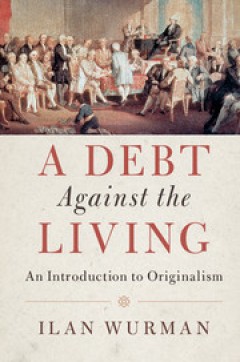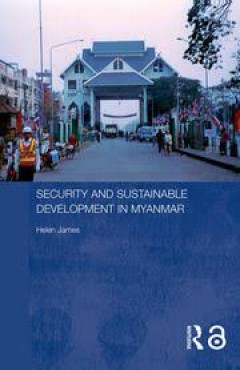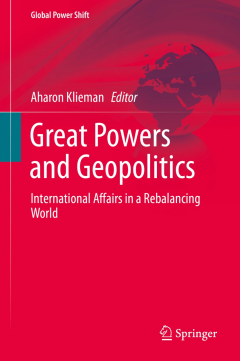Filter by

A Debt Against the Living
Thomas Jefferson famously wrote that the earth belongs to the living. His letter to James Madison is often quoted for the proposition that we should not be bound to the 'dead hand of the past', suggesting that the Constitution should instead be interpreted as a living, breathing document. Less well-known is Madison's response, in which he said the improvements made by the dead - including the U…
- Edition
- -
- ISBN/ISSN
- 9781108304221
- Collation
- 9781108304221
- Series Title
- -
- Call Number
- -

Africa in International Politics External Involvement on the Continent
Locating Africa on the global stage, this book examines and compares external involvement in the continent, exploring the foreign policies of major states and international organizations towards Africa. The contributors work within a political economy framework in order to study how these powers have attempted to stimulate democracy, peace and prosperity in the context of neo-liberal hegemony a…
- Edition
- -
- ISBN/ISSN
- 9780203493175
- Collation
- -
- Series Title
- -
- Call Number
- -

Good Governance in the Era of Global Neoliberalism Conflict and Depolitizati…
This new collection critically examines the new global policy of 'good governance'. This catchphrase of aid policy and development thinking has been the subject of too little analysis to date. This book redresses the balance. It places the prefix 'good', and exactly what that means, under the microscope and examines the impact of neoliberal governance in a wide range of countries and territorie…
- Edition
- -
- ISBN/ISSN
- 9780203478691
- Collation
- -
- Series Title
- -
- Call Number
- -

Africa and the North Between Globalization and Marginalization
An important new discussion of Africa's place in the international system. This volume discusses Africa's place in the international system, examining the way in which the Westphalian system, in light of the impact of globalization and transnational networks, continues to play a major role in the structuring of Africa's international relations. The book provides a solid empirical analysis…
- Edition
- -
- ISBN/ISSN
- 9780203414484
- Collation
- -
- Series Title
- -
- Call Number
- -

Japan's China Policy A Relational Power Analysis
Japan's China Policy understands Japan's foreign policy in terms of power - one of the most central concepts of political analysis. It contributes a fresh understanding to the subject by developing relational power as an analytical framework and by applying it to significant issues in Japan's China policy: the negotiations for a bilateral investment protection treaty and the disputed Pinnacle (…
- Edition
- -
- ISBN/ISSN
- 9780203023792
- Collation
- -
- Series Title
- -
- Call Number
- -

Order and Security in Southeast Asia Essays in Memory of Michael Leifer
Michael Leifer, who died in 2001, was one of the leading scholars of Southeast Asian international relations. He was hugely influential through his extensive writings and his contacts with people in government and business in the region. In this book, many of Leifer’s students, colleagues and friends come together to explore the key themes of his work on Southeast Asia, including the notio…
- Edition
- -
- ISBN/ISSN
- 9780203014813
- Collation
- -
- Series Title
- -
- Call Number
- -

Conflict and Change in EU Budgetary Politics
Why did the European Union experience a stark variation in the levels of conflict between the late 1970s, when budgetary disputes dominated European politics, and the 1990s, when political actors were able to settle upon budgetary agreements without major conflicts? This book responds to this key question with a two-step argument: Its first part shows that decision-making rules can be regard…
- Edition
- -
- ISBN/ISSN
- 9780203002766
- Collation
- -
- Series Title
- -
- Call Number
- -

Security and Sustainable Development in Myanmar
Helen James considers security in Myanmar/Burma. She uses the ideas put forward in the United Nations Development Programme's 1994 report, of human, as opposed to state and security, going on to argue that freedom from want, and freedom from fear (of the regime) are in fact mutually supportive ideas, and that the security of the people and the security of the state are in fact in a symbiotic re…
- Edition
- -
- ISBN/ISSN
- 9780203001981
- Collation
- -
- Series Title
- -
- Call Number
- -

"Great Powers and Geopolitics: Great Powers and Geopolitics
This book presents the theoretical-historical-comparative political framework needed to fully grasp the truly dynamic nature of 21st century global affairs. The author provides a realistic assessment of the shift from U.S predominance to a new mix of counterbalancing rival middle-tier and assertive regional powers, while highlighting those geopolitical zones of contention most critical for futu…
- Edition
- -
- ISBN/ISSN
- 978-3-319-16288-1
- Collation
- X, 264
- Series Title
- -
- Call Number
- 341.52 GRE

Israel’s Invisible Negev Bedouin : Issues of Land and Spatial Planning
This Brief provides a contextual framework for exploring the settlement rights of Israel's Bedouin population of the Negev desert, a traditionally pastoral nomadic Arab population. In 1948, the Israeli government relocated this population from the Negev region to settlements in Siyag. The explicit aim was to control the Negev area for security purposes, sedentarize a nomadic people, and to imp…
- Edition
- -
- ISBN/ISSN
- 978-3-319-16820-3
- Collation
- -
- Series Title
- -
- Call Number
- -
 Computer Science, Information & General Works
Computer Science, Information & General Works  Philosophy & Psychology
Philosophy & Psychology  Religion
Religion  Social Sciences
Social Sciences  Language
Language  Pure Science
Pure Science  Applied Sciences
Applied Sciences  Art & Recreation
Art & Recreation  Literature
Literature  History & Geography
History & Geography